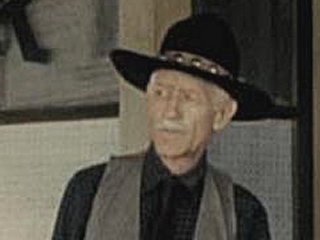Related Research Articles

Wilfred Van Norman Lucas was a Canadian American stage actor who found success in film as an actor, director, and screenwriter.

Tom London was an American actor who played frequently in B-Westerns. According to The Guinness Book of Movie Records, London is credited with appearing in the most films in the history of Hollywood, according to the 2001 book Film Facts, which says that the performer who played in the most films was "Tom London, who made his first of over 2,000 appearances in The Great Train Robbery, 1903. He used his birth name in films until 1924.

A bush airplane is a general aviation aircraft used to provide both scheduled and unscheduled passenger and flight services to remote, undeveloped areas, such as the Canadian north or bush, Alaskan tundra, the African bush, or savanna, Amazon rainforest or the Australian Outback. They are used where ground transportation infrastructure is inadequate or does not exist.
Leslie Armande Norman was an English post-war film director, producer and editor who also worked extensively on 1960s television series later in his career.
Sydney Fowler Wright was a British editor, poet, science fiction author, writer of screenplays, mystery fiction and works in other genres, as well as being an accountant and a conservative political activist. He also wrote as Sydney Fowler and Anthony Wingrave.
Ian Dalrymple was a British screenwriter, film director, film editor and film producer.

John Paddy Carstairs was a British film director (1933–62) and television director (1962–64), usually of light-hearted subject matter. He was also a comic novelist and painter.

Clyde Wilfred Cook was an Australian-born vaudevillian who went on to perform in Hollywood and whose career spanned the silent film era, talkies and television.

Ion Llewellyn Idriess, was a prolific and influential Australian author. He wrote more than 50 books over 43 years between 1927 and 1969 – an average of one book every 10 months, and twice published three books in one year. His first book was Madman's Island, published in 1927 at the age of 38, and his last was written at the age of 79. Called Challenge of the North, it told of Idriess's ideas for developing the north of Australia.
Alan Brown Le May was an American novelist and screenplay writer.

Earl Dwire, born Earl Dean Dwire, was an American character actor who appeared in more than 150 movies between 1921 and his death in 1940.

Lafayette S. "Lafe" McKee was an American actor who appeared in more than 400 films from 1912 to 1948. Part of his career was spent with Art Mix Productions. McKee also worked as a stage actor from 1910 until at least 1932, and began working in show business in 1893.
W. P. LipscombWilliam Percy Lipscomb, was a British-born Hollywood playwright, screenwriter, producer and director. He died in London in 1958, aged 71.

William MacLeod Raine, was a British-born American novelist who wrote fictional adventure stories about the American Old West.

Clifford Heatherley Lamb was an English stage and film actor.
The Independent Theatre Ltd., was an Australian dramatic society founded in 1930 by Dame Doris Fitton, and was also the name given to the building it occupied from 1938. It was named for London's Independent Theatre Society founded by J. T. Grein and was one of several amateur drama groups of high standard which sprang up in Sydney, Australia in the 1930s to fill the gap left by the closure of all but two professional theatres. The range of plays essayed was impressive – from classics to avant-garde pieces, from recent West End and Broadway successes to offerings from local dramatists. The death of Doris Fitton's co-producer Peter Summerton in 1969 put extra strain on her deteriorating health, and with no-one able or willing to fill her shoes, the Independent closed in 1977. It was to reopen in 1998, continuing its tradition as a training ground for young actors and playwrights.
Edward Vivian Timms (1895–1960), better known as E. V. Timms, was an Australian novelist and screenwriter. He was injured serving in the Gallipoli Campaign during World War I and was an unsuccessful soldier settler before turning to writing. He became a popular novelist, and also wrote scripts for films and radio. He served as an officer during World War II and was on duty the night of the Cowra breakout. He has been called "Australia's greatest historical novelist."
William Hatfield (1892–1969) was the pen name of Ernest Chapman, an English-born writer best known for his work in Australia.
George Goodchild, also known as Alan Dare, Wallace Q. Reid, and Jesse Templeton, was a British writer of popular books, short stories, plays, and a writer and director of several movies.
References
- ↑ Roe, Michael. "Noel Norman". The Companion to Tasmanian History. University of Tasmania. Retrieved 30 June 2010.
- ↑ Sydney Morning Herald 24 November 1933
- ↑ FictionMags website Archived 2007-02-25 at the Wayback Machine
- ↑ Camperdown Chronicle 20 May 1937
- ↑ Brisbane Courier (criticism) 14 November 1931
- ↑ Brisbane Courier 26 March 1932
- ↑ Courier Mail (review) 24 March 1934
- ↑ The Argus (review) Friday September 1934
- ↑ The Mercury (review) 12 June 1936